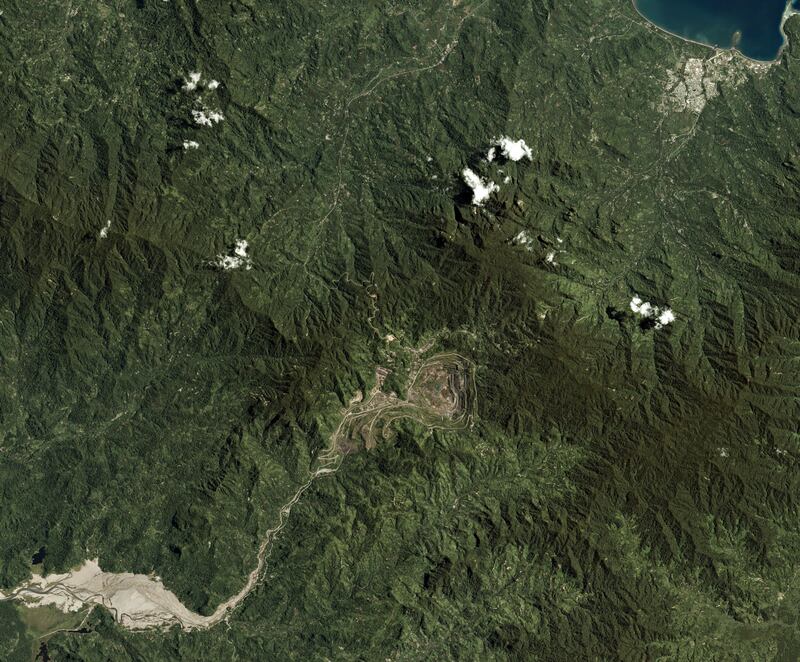UPDATED at 2:39 a.m. ET on 2024-03-08
The Bougainville region of Papua New Guinea, which voted unambiguously for independence in 2019, has refused to recognize the central government’s appointment of a senior police officer in the latest sign of tensions over the autonomous territory’s future.
Bougainville's government wants to achieve its independence aspirations by 2027 but faces opposition from Papua New Guinea's leaders who fear it could encourage secessionist movements in other regions of the volatile Pacific island country.
An estimated 10,000-15,000 people died in a decade-long war between Bougainville and Papua New Guinea, according to an Australian government report on the conflict.
Bougainville President Ishmael Toroama said the appointment earlier this week of a deputy head of police for Bougainville by Papua New Guinea’s police commissioner had “usurped” his government and was a breach of the 2001 peace agreement that officially ended the civil war.
The national government “ignored my government in this decision and we were never consulted nor privy to the process,” Toroama, a former commander in the Bougainville Revolutionary Army, said in a statement Thursday.
“This appointment will not be recognized by the Autonomous Bougainville Government as it is unconstitutional and breaches the Bougainville Peace Agreement,” he said.
The anger at the police appointment comes as frustrations simmer over lack of progress in getting Papua New Guinea’s Parliament to ratify the results of the independence referendum.
Papua New Guinea, the most populous Pacific island country with an estimated 12 million people, is a focus of intensifying U.S.-China rivalry for influence in the Pacific. Some analysts have said Bougainville, home to about 300,000 people, would add a new dimension to the great power competition in the region if it were an independent nation.
Taiwan’s government reportedly wrote to Toroama in 2020 following his election, offering support.
A report from the Washington-based Heritage Foundation in January said China was already preparing for possible Bougainville independence and has previously offered U.S. $1.0 billion for economic development through its contacts with Sam Kauona, a former general in the Bougainville Revolutionary Army and a former presidential candidate.
A statement Thursday from Bougainville Attorney-General Ezekiel Masatt said the central government is treating Bougainville’s people and the law with “careless disregard and disdain.”
Papua New Guinea’s government has “devious and devilish intentions and strategies,” he said.
National Police Commissioner David Manning, at a general press conference on Friday, said that the police force only consults the Bougainville government on the appointment of the head of police in the region, a police spokesperson told BenarNews.

Bougainville, which makes up the easternmost islands of Papua New Guinea and borders the Solomon Islands, is the site of the long-inactive Panguna copper and gold mine – the historical source of conflict with the central government that spiraled into civil war as Bougainville suffered the environmental costs but got little of its substantial earnings.
The Bougainville government in February renewed the exploration license of Bougainville Copper, a company in which Bougainville and Papua New Guinea each have 36% shareholdings. The renewal paves the way for redevelopment of the mine in the coming years, the company said citing Toroama, and offers a potential windfall for impoverished Bougainville as the mine has among the world’s largest copper deposits.
Masatt’s statement also criticized the failure of Papua New Guinea’s Parliament to consider ratification of the results of the independence referendum, which got more than 97% support from Bougainville’s voting public.
Despite an agreement between Toroama and Prime Minister James Marape, Parliament did not address the issue in 2023 and failed to address it at its first sitting for 2024 in February, he said, instead adjourning the legislature until May.
Papua New Guinea police did not immediately comment on the Bougainville government’s statements, but said Police Commissioner David Manning would hold a press conference on Friday.
The opposition’s Bougainville shadow minister, Puka Temu, said the police appointment is an example of the government failing to maintain respectful relations with the Bougainville administration.
“The government continues to shift the goal posts with their handling of the ratification of the referendum results,” he said.
“It is becoming clear,” Temu said, that the government “is not making enough effort to consult with the ABG [Autonomous Bougainville Government], and this is unnecessarily frustrating a straightforward process.”
This story was updated to include comments from Police Commissioner David Manning.
